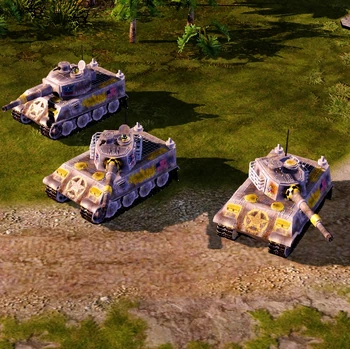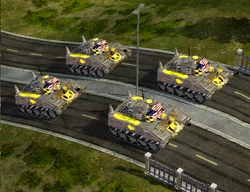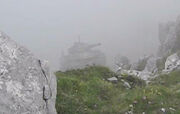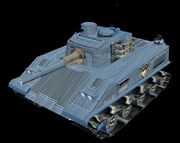Confederate Mastiff Medium Tank
| Panzerkampfwagen VI. Mastiff Ausf. B | |

| |
| A trio of Mastiff tanks | |
| Faction | |
| Minor Faction(s) | |
| Unit Type | Main Battle Tank |
| Designation | Anti Tank |
| Production Building | Vehicle Warehouse |
| Secondary Ability | Charge! Take 75% damage, do 150% damage, double ROF, move towards targeted location. 25 Blast damage on ram. |
| Cost | $1100 |
| Production Time | 0:10 |
| Heroic Upgrade | Patriotism! |
| Dev. Status | In game |
"There ain't nothin' that can stop us!"
- - Mastiff driver.
Tactical Analysis
- Still a Contender: Though it has seen better days, the robust Mastiff is still capable of holding its own against the main battle tanks of other powers. With a 105mm main gun, a .30 cal machine gun, and heavy treads that allow it to squish infantry, the Mastiff is the backbone of Confederate ground forces.
- Hope This Hurts: The Mastiff is not an opponent to be taken lightly. Even if one appears to have the upper hand, Mastiff drivers are known for their tendency to charge at the enemy lines while firing as quickly as possible, something which can turn the tide of battle. The speed at which the Mastiff moves makes it difficult for enemies to hit it, and with its considerable mass, it can be used as a literal battering ram. On the other hand, this manoeuvre could easily leave the Mastiff in a poor position afterwards.
- Dang.: Like all Confederate vehicles, the Mastiff starts considerably weaker than its cost would indicate, and must be upgraded to be at its full effectiveness. In particular, the Mastiff's main gun, when unupgraded, really struggles against enemy armour.
- Rally Around: Some Mastiff crews are hailed as national heroes and even make their presence known in Confederate propaganda. The sight of a Mastiff Tank with a giant American flag draped across its front will revitalise troop morale and cause the troops near the Mastiff to fight with more ferocity than normal.
Background

A platoon of Mastiff VI Ausf. A tanks, infamous for the number of Allied vehicles they have destroyed.
The Panzerkampfwagen VI. Mastiff, or Mastiff Medium Tank, was a German tank first built in 1947, which saw extensive service during the Second World War. Armed with a powerful 88mm cannon, the vehicle was designed as a direct answer to the T-40, then the workhorse of the Soviet Union's tank divisions.
At the time of its construction, it was the largest, heaviest, most advanced battle tank in the world, years ahead of its competitors. Unfortunately for the Germans, when the Soviet Union rolled into Poland they unleashed the T-55 Anvil Heavy Tank, which drastically outgunned the Mastiff. With the formation of the Allied Nations, the Mastiff was selected as the Allied medium tank, and after the inclusion of some American engine upgrades was manufactured in massive numbers; some 35,000 tanks were produced across eight countries and war factories across the world during the war with even more produced afterwards.
In combat the Mastiff performed admirably, usually in conjunction with its lighter counterpart, the Beagle, the Mastiff would strike Anvils from beyond their maximum range with their 88mms, drawing their attention and allowing the Beagle to flank enemy formations and deliver risky, close range killing blows to the enemy rear armour.

An old photo of a Mastiff.
After the war, thousands of Ausf. B Mastiff tanks were stored in the "Boneyard", a vast desert facility in Nevada, where they were allowed t0 rust under the desert sun in case the situation ever got bad enough to require their services again; with heaps of newer more modern 105mm guns at the ready, until retrieved and upgraded by the fledgling Confederate Revolutionaries. However, the Mastiff has not been forgotten by the Allies; the many Allied member states still use the PzKpfw VI Ausf. F as their main battle tank, and it saw extensive action alongside the newer Guardian tank in the recent conflict.
Behind the Scenes
- The Mastiff Tank is based off the German King Tiger, though it went through several design iterations before that.
- One of the things retained through all the designs was the metal basket on the outside of the turret, a feature retained from the original M1 Abrams design.
Just the Stats
| PzKpfw. VI Mastiff | |
| Main Battle Tank | |
| Cost | 1100 |
| Build Time | 0:10 |
| Health | 175 |
| Speed | 60 |
| Armour Type | Heavy Armour |
| 10.5 cm Gun | |
| Drops Off, Move and Fire | |
| Cannon | |
| Range | 350 |
| RPS | 1/3 |
| Damage | 88 |
| Suppression | 25 |
| DPS | 29.3 |
| .303 Remote Turret | |
| Intimidate, Move and Fire | |
| Gun | |
| Range | 210 |
| RPS | 5 |
| Damage | 2 |
| Suppression | 5 |
| DPS | 10 |
Reserve Mastiff Medium Tank
| Panzerkampfwagen VI. Mastiff Ausf. F | |

| |
| Latest variant of the Mastiff tank used by Allied Reservists | |
| Minor Faction | |
| Other Faction(s) | |
| Unit Type | Main Battle Tank |
| Designation | Anti-Tank |
| Production Building | Command Centre |
| Secondary Ability | Switch Spyglass Target Designator/Main Cannon Reduces Target Defence/Ground attack |
| Cost | Unknown |
| Production Time | Unknown |
| Heroic Upgrade | Machine Gun Bulldozer Blade • Mineclearing • Increased HP |
| Dev. Status | Modelled |
Tactical Analysis
- Stand Off: Modernized Mastiff tanks are still used in large numbers by the Allies because of their durability, a trait more recent vehicles have often sacrificed for greater performance. This capability has only grown over new versions of the machine, making the Reservist Mastiff one of the toughest main battle tanks on the field.
- One Oh Five The main gun of the Mastiff is mostly unchanged from its post-upgrade WW2 incarnation, though this matters little as the weapon is still more or less comparable to modern examples. Though it will scrap vehicles, the slow tracking weapon is less than effective against infantry.
- In the Spotlight: The Ausf. F mounts a smaller version of the Spyglass spectrum designator seen on the Guardian Tank. The Reservists use it particularly to guide artillery and airstrikes to the target.
- Urban Combat: In light of the Mastiff's performance during WWIII, the Allies have been distributing kits to improve the Mastiff's survivability in urban warfare. While such kits are in short supply, they provide increased protection and a mineclearing dozer blade, in addition to reintroducing the machine gun present on older models.
Background

A mint-condition Mastiff in original configuration, still painted in 1953 era "Arctic Steel" Allied Blue. This unit has no identifying markers as it was used as a training vehicle, and was later donated to a museum.
Many military analysts now consider the Panzer VI Mastiff to be a tank that was ahead of its time.
When the Mastiff was first revealed, following the lifting of armament restrictions on Germany, the rest of Europe was shocked; it had thick, heavily sloped armour that was impervious to most anti-tank weapons, while the powerful 88mm main gun would have had little trouble punching through the armour of its counterparts in other countries. Had Germany gone to war with the rest of Europe, one can only imagine that the Mastiff would have been virtually unstoppable, pitted against the tank designs of the other European countries.
As it were, this never came to pass; instead, in the wake of a massive Soviet invasion, Germany would eventually be asked to disseminate plans for the Mastiff to the rest of the Allied Nations; the Mastiff, it turned out, was the one tank that could stand up to the Soviet Anvil and have a chance of winning. In factories throughout the Allied Nations, Mastiff tanks were produced in vast numbers, to stand against the Soviet juggernaut.
The formidable design has withstood the test of time; since the end of the war, the trend in Allied tank design has been to focus more on speed and firepower. As a result of this, the Mastiff remains one of the most durable tanks in the Allied inventory, with its 180mm thick sloped steel (later replaced with more advanced materials) armour; its 105mm, on the other hand, while outclassed by newer weapons such as the Guardian's 90mm smoothbore gun, is still considered a formidable weapon. Considering all this, it is no surprise that so many Allied member nations continue to use the Mastiff tank.
This has been greatly helped by the fact that original makers Henschel & Son have introduced a number of upgrades to the Mastiff's design over the years. The latest Mastiff variant, the Ausf. F, boasts a number of improvements over its previous iterations; the most obvious of these, however, is the installation of a "Spyglass" target designator, which allows the Mastiff to designate targets similarly to the Guardian MBT. Additionally, to increase the Mastiff's flexibility, Henschel & Son has also released a number of kits to customise Mastiffs for more specialised roles; the most popular is the urban combat kit, which adds a Browning heavy machine gun and a front mounted dozer blade.
|
Allied Reservist National Armies
Paradox-Exclusive Mini-Faction. | |
| Infantry | Defender • Rocket Defender |
| Combat Vehicles | Ranger Battle Car • Retriever APC • Crusader Medium Tank • Pershing Howitzer • Steelrain Artillery • Wolfhound Tank Destroyer • Chrono Miner |
| Watercraft | Horizon Frigate |
| Aircraft | Cardinal Slick |
| Structures | Command Centre • MK2 SPAM Refinery • GPS Uplink |
| Reinforcements | Recon Peacekeeper • Recon Leopard • Condor Heavy Lift Transport • Hawker Spectre • Revenant Gunship |
| Detailed Information | Allied Reserve Forces Characters • Vietnam War • National Militaries of the Allied Nations Member States • Reservist Supply Pad Reinforcements • GPS Uplink Doctrines |
Blue China Mastiff Medium Tank
| Panzerkampfwagen VI. Mastiff Ausf. D | |

| |
| A Mastiff of the 1024th National Army | |
| Minor Faction | |
| Other Faction(s) | |
| Unit Type | Amphibious Main Battle Tank |
| Designation | Anti-Garrison/Anti-Ground |
| Production Building | Command Bunker |
| Secondary Ability | Trench Dragger |
| Cost | Unknown |
| Production Time | Unknown |
| Heroic Upgrade | Twin Guns |
| Dev. Status | Skinned |
Tactical Analysis
- Taking Back The Line: Blue China Mastiffs were the most flexible tank in the civil war and in post-apocalyptic China today, with a main gun for tanks, a grenade launcher for infantry and degarrisoning, and amphibious capability.
- ...Keeping It: When not taking positions or being a glorified gun turret, the Mastiff can dig trenches as protection for friendly infantry.
- ...And Not Going Anywhere Fast: Like all tanks, the Ausf. D is still vulnerable to being flanked and is slow on both land or water. Though in China, they're usually worrying more about swarms of anti-tank infantry.
- The Blue Anvil: Mastiff crews who have survived while others have perished typically salvage what they can from their deceased comrades' vehicles. Most take an extra gun for a one two armour piercing punch that helps the crew better engage Nians, Battlemasters, and the like.
Before the Bombs
One of the advantages the Nationalists did have was that they simply had more money. Since it was supported by the Allied Nations between the wars, the funds needed were relatively small compared to the arming the Peacekeepers and various humanitarian programs. The Red Chinese, however, were supported by nations that relied heavily on a controlled economy, which meant they received very little hard cash along with their arms.
To the Blue Chinese, though, money was one of their greatest weapons. Money meant more supplies could be bought, more advanced weapons, even mercenaries like Legion Security when they needed more men. One of the biggest advantages to this, though, was that they were able to buy tanks instead of indigenous designs. Chief among them was the main battle tank of the Allies, the Mastiff.
The Blue China modified their locally produced Mastiffs, variant Ausf. D, to be amphibious, and to be able to go hull down in any terrain. Though the Mastiffs the Nationalists received were initially of the Ausf. B variant, Blue Chinese engineers were ordered to make some upgrades in order to make Mastiffs more flexible when compared to Red Chinese Battlemasters. The Chinese variant has a fragmentation grenade launcher instead of a machine gun to suit better to the Blue Chinese warfare and to give the Mastiff even more firepower. When Henschel & Son, creators of the Mastiff, heard about this variant, they started making them and selling them to Blue China for a much better price.
Furthermore, since they were expected to keep on a line and hold it with infantry support, Blue Chinese engineers attached jury rigged trench diggers on the rear of all their Mastiffs. In a pinch, Mastiffs could tear the ground to produce trenches in the ground for their foot bound allies. Though not as deep as a prepared trench, often battlelines would be moved and infantry would need even a modicum of protection in order to survive. Even without infantry support, the Mastiff was one of the most powerful tanks in the Chinese Civil War, and in the rare times that Mastiffs were required to move, the Red Chinese feared the firepower and adaptability of the Mastiff, as the Soviets once did as well.
After the Bombs
At the closing stages of the war, the Mastiff tanks moved less and less from their positions, until eventually they stopped moving all together. Their engines were removed and used elsewhere, and the Mastiffs became little more than glorified turrets, their extra equipment left to rust as they were dedicated to holding points in massive trench systems. Red China had abandoned complicated battle maneuvers to simply throwing wave after wave of men and armour at Nationalist positions, negating the need to counterattack in the first place. Eventually, the points they were defending were destroyed in nuclear fire, and they were abandoned completely in the empty landscape.
However, once again they were pressed into the service of Blue China. It became clear that Red China was not only still operating, but had massive amounts of tanks. Tanks that needed to be countered. Blue China set out to find every Mastiff tank they could, and if possible, drag them back to their bunkers. Any neglect was addressed as best they could, though few tanks operate as well as they once did.
The trench diggers in particular had to be sharpened and made to be heavier, in order to break through the new ground of China, sometimes nothing more than radioactive glass. The new drivers of any recovered tanks were picked from among the finest of surviving tank crews, and given the honourary titles of "Youxia" - becoming equivalent to that of minor noble and knight in the new kingdoms of Blue Chinese warlords.
Engines, however, were another matter, as very few could be found that were still operating and not in the hands of unsympathetic scavengers. When attempts to recover enough failed, Blue China once again looked to its allies for aid. The Allied Nations, however, could not spare any supplies due to their war with the Soviet Union. It was only much later that the Blue Chinese were finally able to get many engines.
Using a tenuous chain of smugglers, backdoor men, surviving Nationalist infiltrators, and pirates, several of the fiefdoms were able to get into contact with a branch of the Confederates. Accepting stolen blood diamonds recovered from Red Chinese hands as payment, the Confederates were willing to send supplies, including engines, back through the chain of contacts to China. With this exchange of interests, many old Mastiff engines that would otherwise be left lying in the Boneyard could be illicitly sent back to the Chinese warlords, who soon enough were putting the Mastiffs back into mostly-working order once more.
|
National Revolutionary Army
Paradox-Exclusive Mini-Faction. | |
| Infantry | Nationalist • National Garrison • National Protector |
| Vehicles | Whippet Half-Track • Minzu Heavy Tank • Barker Tank Destroyer • Retriever Mortar Tank |
| Fire Support | Vickers Machine Gun • 17 Pound Gun • Silkworm Missile Post • Dire Wolf Fortress Tank • Shih Tzu CPV |
| Structures | Command Bunker • Supply Bunker • Consulate District • Radar Signal Bunker • Emplacement • Munitions Pillbox |
| Special Units | Monitor |
| Indian Reservists Reinforcements | Indian Defender • DUKW • Crocodile Hovertank • Cutlass Ramjet • Shortbow Helicopter |
| Praetorians Reinforcements | National Guardians • Unfallen • Crossbow Helicopter • Hawker Jingwei • Bluejay Gunship |
| Detailed Information | Chinese Civil War • Blue Chinese Characters • Consulate District Upgrades • Consulate District Upgrades Visuals |



